unit9 warming up[上学期]
文档属性
| 名称 | unit9 warming up[上学期] |
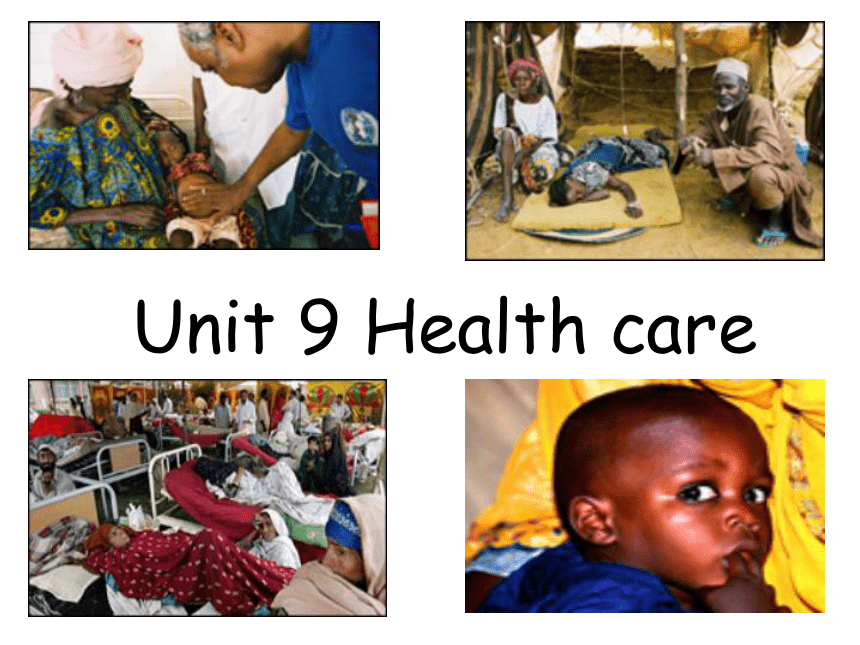
|
|
| 格式 | rar | ||
| 文件大小 | 5.5MB | ||
| 资源类型 | 教案 | ||
| 版本资源 | 通用版 | ||
| 科目 | 英语 | ||
| 更新时间 | 2006-11-12 00:00:00 | ||
图片预览

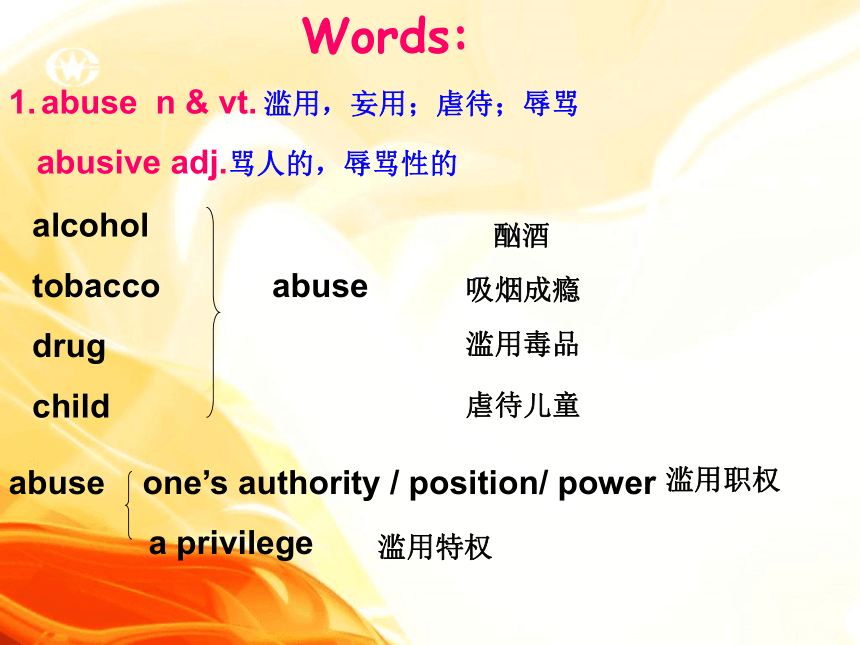
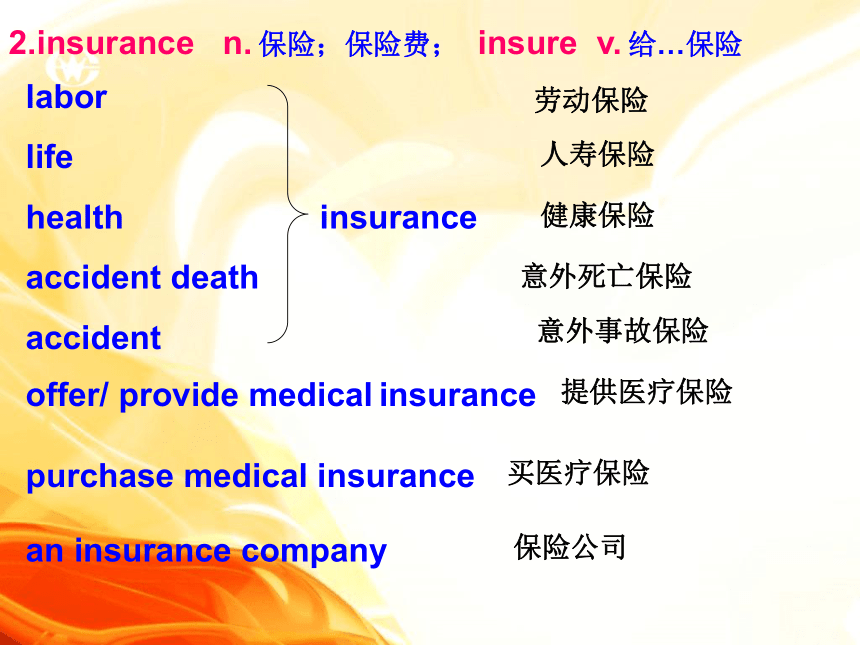
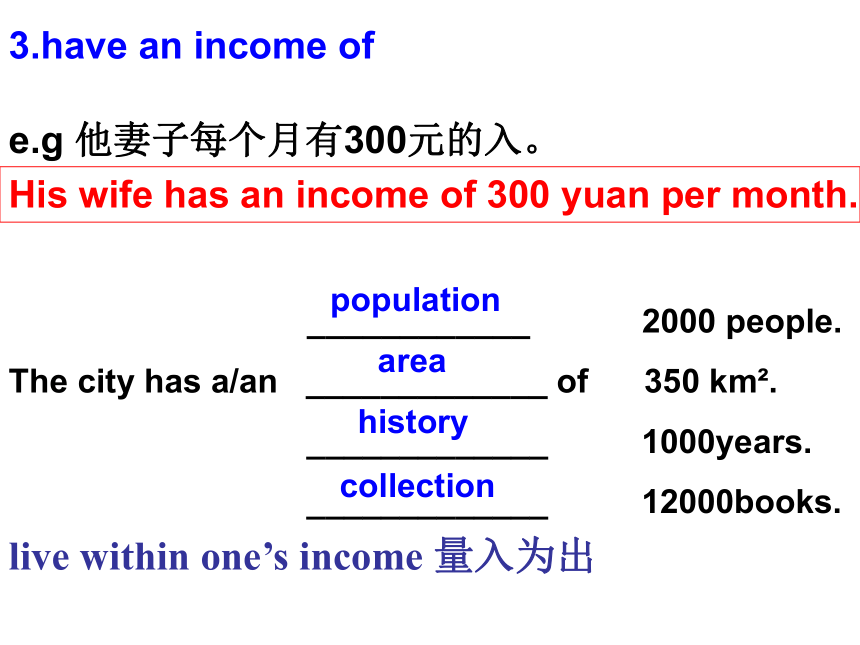

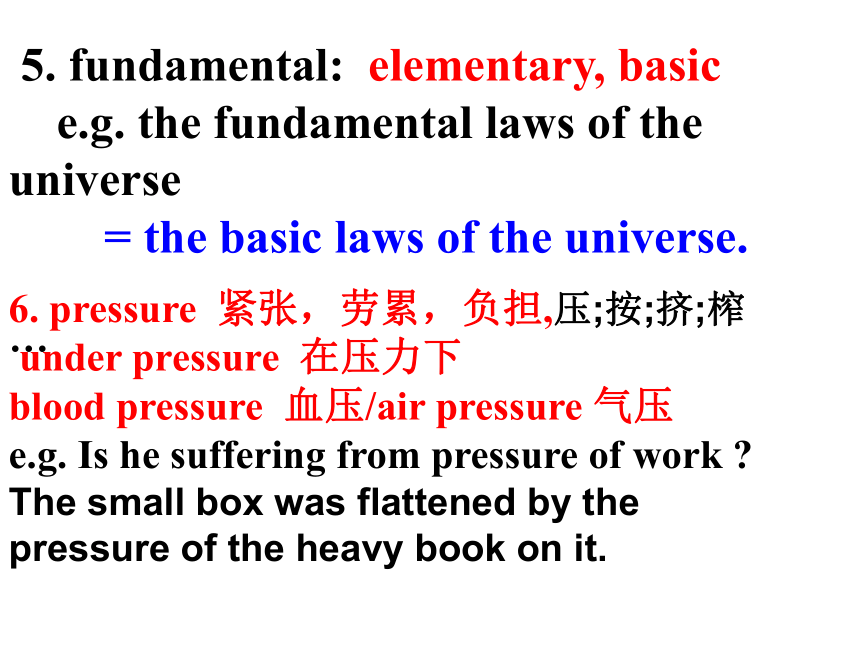
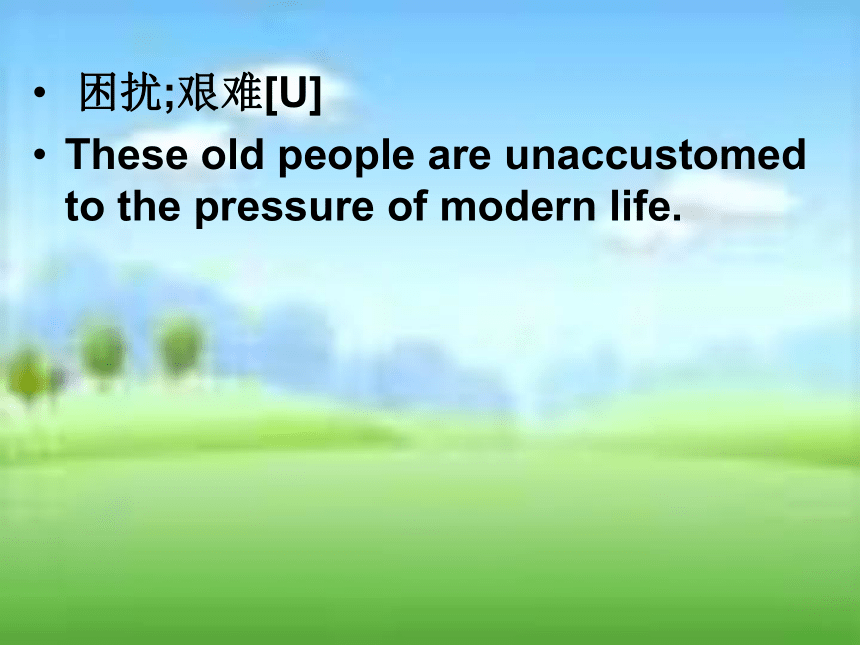
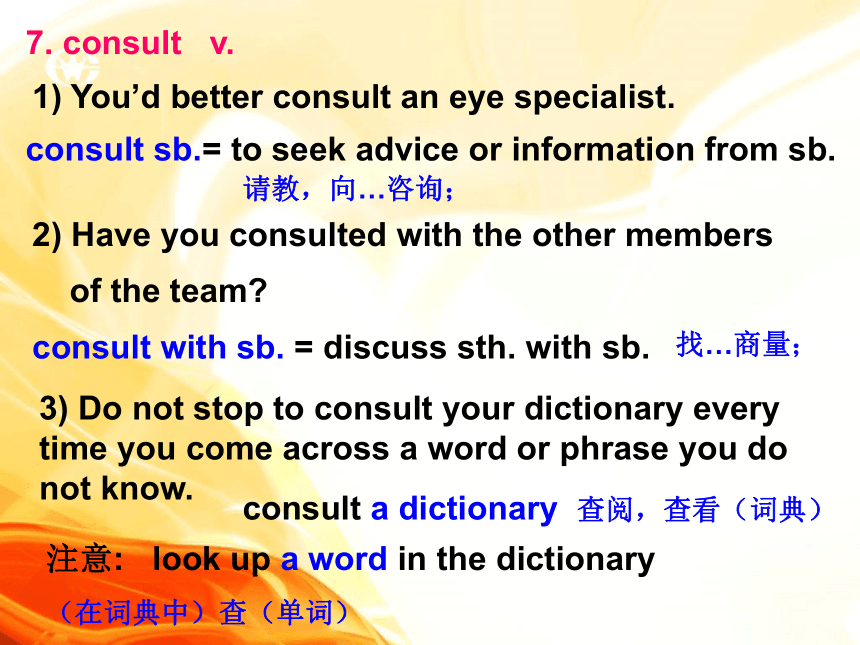



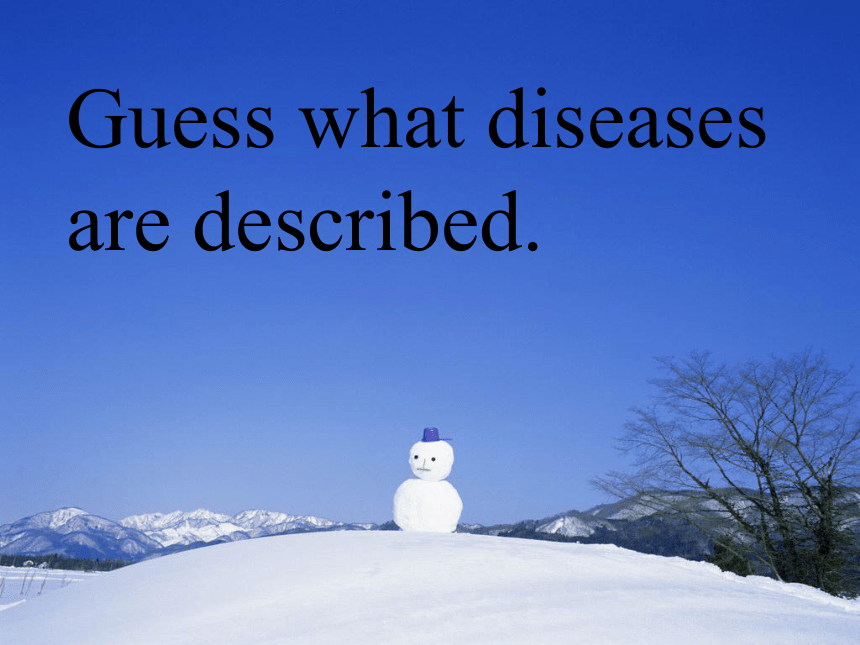
文档简介
课件40张PPT。Unit 9 Health careWords:
abuse n & vt. 滥用,妄用;虐待;辱骂
abusive adj.骂人的,辱骂性的alcohol
tobacco abuse
drug
child酗酒吸烟成瘾滥用毒品虐待儿童abuse one’s authority / position/ power
a privilege滥用职权滥用特权2.insurance n. 保险;保险费; insure v. 给…保险labor
life
health insurance
accident death
accident劳动保险人寿保险健康保险意外死亡保险意外事故保险offer/ provide medical insurance提供医疗保险买医疗保险purchase medical insurancean insurance company保险公司3.have an income of ____________ 2000 people.
The city has a/an _____________ of 350 km2.
_____________ 1000years.
_____________ 12000books.
live within one’s income 量入为出
His wife has an income of 300 yuan per month.e.g 他妻子每个月有300元的入。populationareahistorycollection4. allowance n.
1.) 津贴,补贴;零用钱[C]
The child has a weekly allowance of five dollars.
这孩子每星期有五元零用钱。
2.) 分配额;允许额[C]
His allowance for food is $100.
他拨出一百美元用于购买食物。 5. fundamental: elementary, basic
e.g. the fundamental laws of the universe
= the basic laws of the universe. 6. pressure 紧张,劳累,负担,压;按;挤;榨
under pressure 在压力下
blood pressure 血压/air pressure 气压
e.g. Is he suffering from pressure of work ?
The small box was flattened by the pressure of the heavy book on it.
…
困扰;艰难[U]
These old people are unaccustomed to the pressure of modern life.7. consult v. 1) You’d better consult an eye specialist.consult sb.= to seek advice or information from sb.2) Have you consulted with the other members
of the team? consult with sb. = discuss sth. with sb. 3) Do not stop to consult your dictionary every time you come across a word or phrase you do not know.consult a dictionary 查阅,查看(词典)注意: look up a word in the dictionary
(在词典中)查(单词)请教,向…咨询;找…商量;8. fee n.
1.) (付给律师、医生等的)酬金,服务费[C]
I'm afraid I can't afford the doctor's fee.
2.) 费(如学费、会费、入场费等)[C]
They charge a small registration fee.
3.) 赏金,小帐[C]
vt. 付费(或小帐)给
She feed the waiter.
她付给侍者小费。9.vow
vow to do vow that… I vow to love you forever.
= I vow that I will love you forever.take/ make a vow
break a vow
keep a vow立誓,起誓
违反誓约
履行誓约我承诺我会永远爱你.7. significance n.
1.) 重要性, 重要[U]
The proposals they put forward at the meeting were of little significance.
他们会上提出的建议没什么意义
2.) 意义, 含义; 意思[U][S]
He did not understand the significance of my wink.
他没有领会我眨眼的意思。Guess what diseases are described. Most of us have the experience of suffering from it. It is caused by viruses and is spread when people touch an infected area or breathe the same air as an infected person. It is not very dangerous. Sneezing, scratchy throat, runny nose usually are the first signs. It is usually mild, with symptoms lasting 1 to 2 weeks. To protect ourselves, we should try to avoid going to public places often.the common coldNo one is really sure what caused it. It is a disease that affects our cells. It does not spread, but it seems likely that it is linked to our DNA and genes. Some are deadly and all are serious. Many can be cured by operations or chemical treatment. There is no sure way to protect yourself from it, but you can keep a healthy diet and avoid things that are known to cause it, eg smoking and drinking alcohol.CancerCancerThe illness first appeared in November 2002 in Guangdong Province in southern China. Its cause was unknown and available treatment was ineffective. By February 2003 new cases of the illness were reported in Hong Kong, Vietnam, Singapore, and Canada. Despite the public-health measures, more than 8,000 cases were reported in 32 countries and the disease caused 800 deaths by the time the outbreak was declared contained in July 2003.SARSSARS Severe Acute Respiratory Syndrome 【医】严重急性呼吸道综合症 It is caused by the virus HIV. If a person gets the disease, his or her immune system will be destroyed, and he or she will become sick, at last, he or she will die.AIDSAIDS Acquired Immune Deficiency Syndrome 后天免疫缺乏症候群 人类免疫缺乏病毒 HIV
(Human Immunodeficiency Virus ) It is caused by different subtypes of influenza, a virus affecting chickens, ducks and other birds, which can cause mild disease. It can mutate (change) into viruses that can cause serious disease. It is very serious, and many people died of it.Bird FluBird FluAvian influenza狂犬病 Rabies
Rabies is a vaccine-preventable disease, and it is still a significant public health problem in many countries of Asia and Africa, even though safe, effective vaccines for both human and veterinary use exist. Most of the ? 55 000 deaths from rabies reported annually around the world occur in Asia and Africa, and most of the victims are children: 30–50% of the reported cases of rabies—and therefore deaths—occur in children under 15 years of age. The main route of transmission is the bites of rabid dogs. Most of the children who die from rabies were not treated or did not receive adequate post-exposure treatment. Although the efficacy and safety of modern cell culture vaccines have been recognized, some Asian countries still produce and use nervous tissue vaccines, which are less effective, require repeated visits to the hospital and often have severe side-effects. Lead in Can you think of the situations
where people need help?
Serious illness, jobless, accidents,
wars, disasters… 2. While one is in such situations,
which organization can help besides
the people around him or her?
The WHO together with the
government.the Word Health
OrganizationListening TextPart 1
The World Health Organisation, or WHO, was created by the United Nations in 1948. The goal of the WHO is to help people all over the world to live a healthy life. In order to reach this goal, the WHO runs programmesto fight diseases, improve sanitation, and stop alcohol, tobacco and other drug abuse.
One of the WHO’s greatest successes to date is playing a major part in freeing the world from smallpox, which was once a feared disease. The organisation has also helped limit the bad influence of new diseases like SARS and HIV/AIDS.
The defeat of smallpox is a good example of how the WHO works. Smallpox is a contagious disease that causes blindness and even death. In the 10th century, Chinese doctors discovered that healthy people who were given small doses of smallpox became immune to the disease. At the time, however, this method was not safe and didn’t always work. Later, in the 18th century, a British doctor found a safer way to protect people against the disease. But it was not until 1967, when the WHO started a large programme to fight smallpox, that people could get protection in an easy and safe way.
The WHO programme reached people everywhere and put a stop to the spread of the disease. In 1977, the last smallpox case occurred. Three years later. With no new cases, the WHO declared that the world was free from smallpox.Part 2Acquired Immune Deficiency Syndrome
后天免疫缺乏症候群
The WHO is also working to prevent and treat diseases like AIDS and polio. Several programmes exist that are aimed at improving health care in the world and protecting people against new diseases. In 2003, the world saw a new and frightening disease. An unknown virus infected people in China and many people died of it. Scientists and doctors soon discovered the virus and called it SARS. Because of modern transportation, SARS quickly spread to other parts of the world. Canada and China were among the worst affected areas. The governments tried their best to stop the disease from spreading and quickly arranged hospitals, nurses and doctors to treat the SARS victims. People who were travelling had to check their temperatures and tell where they were going and whom they would visit. The WHO played an important role. It worked together with the governments to control the outbreak. As an international organisation with many years of experience of dealing with diseases, the WHO could provide warnings, information and help. As a result, the disease was controlled and prevention measures were put in place to make sure that any new outbreak could be dealt with in a good way.Phrases:
devote oneself to sth./doing sth.
be devoted to sth./doing sth.献身于,致力于
他一生都致力于癌症的治疗工作。He devoted himself to the cure of cancer all his life.look forward to
be used to/be accustomed to
stick to
get down to
pay attention to
contribute to 期望
习惯于
坚持
开始着手做某事
注意
有助于,促成Listening:The world health organization is devoted to improving people’s health . be devoted to 致力于…,热爱…,忠诚于…
devote oneself to sth./doing sth.
be devoted to sth./doing sth.
他一生都致力于癌症的治疗工作。
献身于,致力于He devoted himself to the cure of cancer all his life.look forward to
be used to/be accustomed to
stick to
get down to
pay attention to
contribute to 期望
习惯于
坚持
开始着手做某事
注意
有助于,促成
play an important role in …在…起重要用
play an leading role …起带头作用
plays the role of sb…扮演某人角色
e.g. 1 . Science plays an important role in developing production . 2.Do you think that the WTO plays an important role in …3.In what way was the SARS outbreak different from past diseases ?名词Outbreak是由动词 break out转化而来的,意为 “爆发;发挥”
E.g. an outbreak of anger / fever /hostilities
发怒/发烧/ 开战
4.What steps were taken to control the
disease ?
take steps 采取措施
e.g. The best step to take is to send him a
message .
4.How did the WHO assist governments in
trying to control SARS ?
assist sb .sb with. /in doing sth./to do sth .
帮助某人做某事
E.g.1. Tom assists him to fill in the forms .
Nanchang, JX on Sept. 13-14, 2005
abuse n & vt. 滥用,妄用;虐待;辱骂
abusive adj.骂人的,辱骂性的alcohol
tobacco abuse
drug
child酗酒吸烟成瘾滥用毒品虐待儿童abuse one’s authority / position/ power
a privilege滥用职权滥用特权2.insurance n. 保险;保险费; insure v. 给…保险labor
life
health insurance
accident death
accident劳动保险人寿保险健康保险意外死亡保险意外事故保险offer/ provide medical insurance提供医疗保险买医疗保险purchase medical insurancean insurance company保险公司3.have an income of ____________ 2000 people.
The city has a/an _____________ of 350 km2.
_____________ 1000years.
_____________ 12000books.
live within one’s income 量入为出
His wife has an income of 300 yuan per month.e.g 他妻子每个月有300元的入。populationareahistorycollection4. allowance n.
1.) 津贴,补贴;零用钱[C]
The child has a weekly allowance of five dollars.
这孩子每星期有五元零用钱。
2.) 分配额;允许额[C]
His allowance for food is $100.
他拨出一百美元用于购买食物。 5. fundamental: elementary, basic
e.g. the fundamental laws of the universe
= the basic laws of the universe. 6. pressure 紧张,劳累,负担,压;按;挤;榨
under pressure 在压力下
blood pressure 血压/air pressure 气压
e.g. Is he suffering from pressure of work ?
The small box was flattened by the pressure of the heavy book on it.
…
困扰;艰难[U]
These old people are unaccustomed to the pressure of modern life.7. consult v. 1) You’d better consult an eye specialist.consult sb.= to seek advice or information from sb.2) Have you consulted with the other members
of the team? consult with sb. = discuss sth. with sb. 3) Do not stop to consult your dictionary every time you come across a word or phrase you do not know.consult a dictionary 查阅,查看(词典)注意: look up a word in the dictionary
(在词典中)查(单词)请教,向…咨询;找…商量;8. fee n.
1.) (付给律师、医生等的)酬金,服务费[C]
I'm afraid I can't afford the doctor's fee.
2.) 费(如学费、会费、入场费等)[C]
They charge a small registration fee.
3.) 赏金,小帐[C]
vt. 付费(或小帐)给
She feed the waiter.
她付给侍者小费。9.vow
vow to do vow that… I vow to love you forever.
= I vow that I will love you forever.take/ make a vow
break a vow
keep a vow立誓,起誓
违反誓约
履行誓约我承诺我会永远爱你.7. significance n.
1.) 重要性, 重要[U]
The proposals they put forward at the meeting were of little significance.
他们会上提出的建议没什么意义
2.) 意义, 含义; 意思[U][S]
He did not understand the significance of my wink.
他没有领会我眨眼的意思。Guess what diseases are described. Most of us have the experience of suffering from it. It is caused by viruses and is spread when people touch an infected area or breathe the same air as an infected person. It is not very dangerous. Sneezing, scratchy throat, runny nose usually are the first signs. It is usually mild, with symptoms lasting 1 to 2 weeks. To protect ourselves, we should try to avoid going to public places often.the common coldNo one is really sure what caused it. It is a disease that affects our cells. It does not spread, but it seems likely that it is linked to our DNA and genes. Some are deadly and all are serious. Many can be cured by operations or chemical treatment. There is no sure way to protect yourself from it, but you can keep a healthy diet and avoid things that are known to cause it, eg smoking and drinking alcohol.CancerCancerThe illness first appeared in November 2002 in Guangdong Province in southern China. Its cause was unknown and available treatment was ineffective. By February 2003 new cases of the illness were reported in Hong Kong, Vietnam, Singapore, and Canada. Despite the public-health measures, more than 8,000 cases were reported in 32 countries and the disease caused 800 deaths by the time the outbreak was declared contained in July 2003.SARSSARS Severe Acute Respiratory Syndrome 【医】严重急性呼吸道综合症 It is caused by the virus HIV. If a person gets the disease, his or her immune system will be destroyed, and he or she will become sick, at last, he or she will die.AIDSAIDS Acquired Immune Deficiency Syndrome 后天免疫缺乏症候群 人类免疫缺乏病毒 HIV
(Human Immunodeficiency Virus ) It is caused by different subtypes of influenza, a virus affecting chickens, ducks and other birds, which can cause mild disease. It can mutate (change) into viruses that can cause serious disease. It is very serious, and many people died of it.Bird FluBird FluAvian influenza狂犬病 Rabies
Rabies is a vaccine-preventable disease, and it is still a significant public health problem in many countries of Asia and Africa, even though safe, effective vaccines for both human and veterinary use exist. Most of the ? 55 000 deaths from rabies reported annually around the world occur in Asia and Africa, and most of the victims are children: 30–50% of the reported cases of rabies—and therefore deaths—occur in children under 15 years of age. The main route of transmission is the bites of rabid dogs. Most of the children who die from rabies were not treated or did not receive adequate post-exposure treatment. Although the efficacy and safety of modern cell culture vaccines have been recognized, some Asian countries still produce and use nervous tissue vaccines, which are less effective, require repeated visits to the hospital and often have severe side-effects. Lead in Can you think of the situations
where people need help?
Serious illness, jobless, accidents,
wars, disasters… 2. While one is in such situations,
which organization can help besides
the people around him or her?
The WHO together with the
government.the Word Health
OrganizationListening TextPart 1
The World Health Organisation, or WHO, was created by the United Nations in 1948. The goal of the WHO is to help people all over the world to live a healthy life. In order to reach this goal, the WHO runs programmesto fight diseases, improve sanitation, and stop alcohol, tobacco and other drug abuse.
One of the WHO’s greatest successes to date is playing a major part in freeing the world from smallpox, which was once a feared disease. The organisation has also helped limit the bad influence of new diseases like SARS and HIV/AIDS.
The defeat of smallpox is a good example of how the WHO works. Smallpox is a contagious disease that causes blindness and even death. In the 10th century, Chinese doctors discovered that healthy people who were given small doses of smallpox became immune to the disease. At the time, however, this method was not safe and didn’t always work. Later, in the 18th century, a British doctor found a safer way to protect people against the disease. But it was not until 1967, when the WHO started a large programme to fight smallpox, that people could get protection in an easy and safe way.
The WHO programme reached people everywhere and put a stop to the spread of the disease. In 1977, the last smallpox case occurred. Three years later. With no new cases, the WHO declared that the world was free from smallpox.Part 2Acquired Immune Deficiency Syndrome
后天免疫缺乏症候群
The WHO is also working to prevent and treat diseases like AIDS and polio. Several programmes exist that are aimed at improving health care in the world and protecting people against new diseases. In 2003, the world saw a new and frightening disease. An unknown virus infected people in China and many people died of it. Scientists and doctors soon discovered the virus and called it SARS. Because of modern transportation, SARS quickly spread to other parts of the world. Canada and China were among the worst affected areas. The governments tried their best to stop the disease from spreading and quickly arranged hospitals, nurses and doctors to treat the SARS victims. People who were travelling had to check their temperatures and tell where they were going and whom they would visit. The WHO played an important role. It worked together with the governments to control the outbreak. As an international organisation with many years of experience of dealing with diseases, the WHO could provide warnings, information and help. As a result, the disease was controlled and prevention measures were put in place to make sure that any new outbreak could be dealt with in a good way.Phrases:
devote oneself to sth./doing sth.
be devoted to sth./doing sth.献身于,致力于
他一生都致力于癌症的治疗工作。He devoted himself to the cure of cancer all his life.look forward to
be used to/be accustomed to
stick to
get down to
pay attention to
contribute to 期望
习惯于
坚持
开始着手做某事
注意
有助于,促成Listening:The world health organization is devoted to improving people’s health . be devoted to 致力于…,热爱…,忠诚于…
devote oneself to sth./doing sth.
be devoted to sth./doing sth.
他一生都致力于癌症的治疗工作。
献身于,致力于He devoted himself to the cure of cancer all his life.look forward to
be used to/be accustomed to
stick to
get down to
pay attention to
contribute to 期望
习惯于
坚持
开始着手做某事
注意
有助于,促成
play an important role in …在…起重要用
play an leading role …起带头作用
plays the role of sb…扮演某人角色
e.g. 1 . Science plays an important role in developing production . 2.Do you think that the WTO plays an important role in …3.In what way was the SARS outbreak different from past diseases ?名词Outbreak是由动词 break out转化而来的,意为 “爆发;发挥”
E.g. an outbreak of anger / fever /hostilities
发怒/发烧/ 开战
4.What steps were taken to control the
disease ?
take steps 采取措施
e.g. The best step to take is to send him a
message .
4.How did the WHO assist governments in
trying to control SARS ?
assist sb .sb with. /in doing sth./to do sth .
帮助某人做某事
E.g.1. Tom assists him to fill in the forms .
Nanchang, JX on Sept. 13-14, 2005
